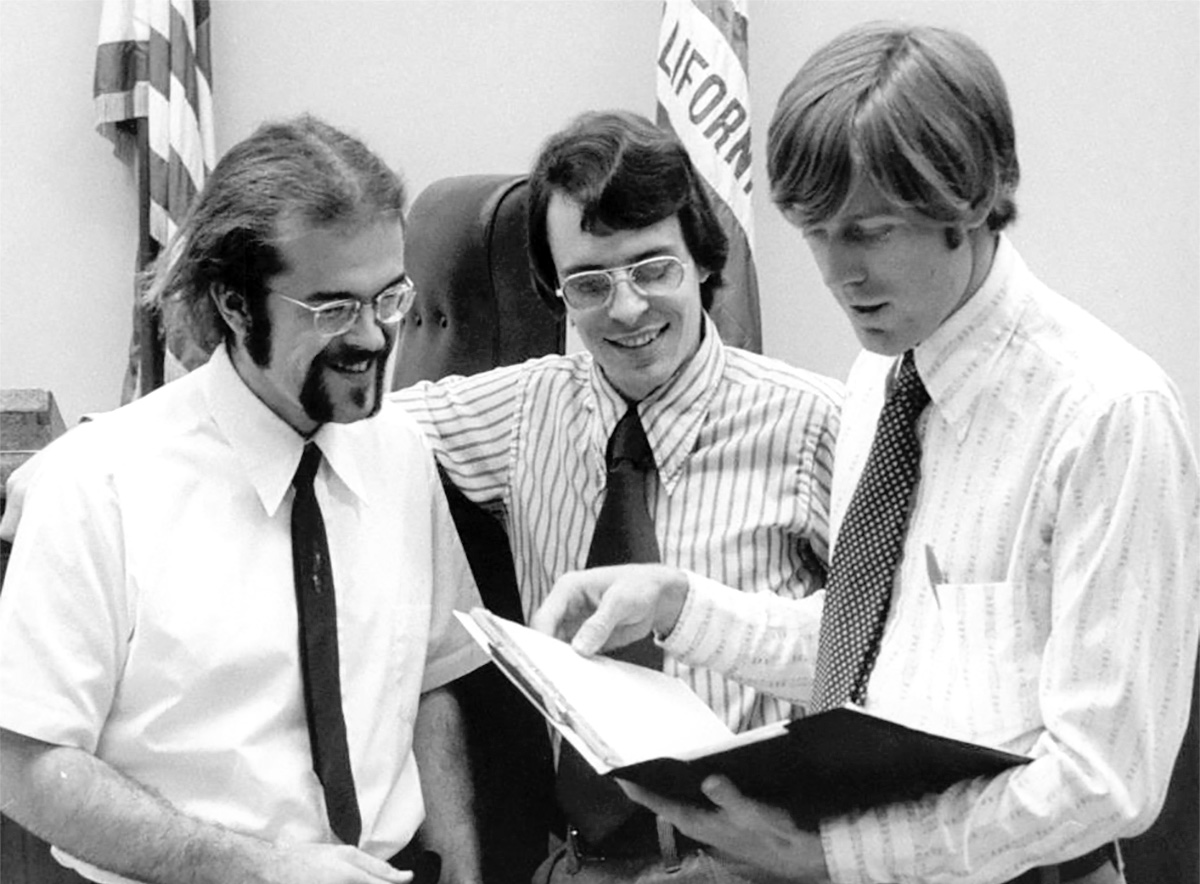
“‘We know you’re out there; where are you?’ So might be the initial rallying cry of the newly formed Gay Law Students of California to prospective members.”
With those words in an April 1972 press release, a pioneering consortium of law school students, including members of LMU Loyola Law School, joined together and began a civil rights movement that celebrates its 50th year, including a series of events for OutLaw History Week at LLS beginning on Monday, Oct. 17. OutLaw is an organization of lesbian, gay, bisexual, transgender, and queer students and their allies at LMU Loyola Law School who strive to provide current information regarding the legal and political issues facing the LGBTQ community, as well as offer academic and social peer support and professional guidance.
“I never dreamed that the association would be around 50 years later,” said Tom Coleman, LLS ’73, one of the founding members of the group. “I am impressed by how robust and involved the current board and membership are. Sponsoring OutLaw History Week with events each day of the week – it is impressive!”
Coleman was a student at LLS in 1972, according to his biography “The Domino Effect,” but did “not do anything gay” for fear of losing his scholarship at a Catholic institution. Then he saw a notice on a bulletin board at the law school advertising a gay law student gathering at a local bar. Thinking it was a joke, or even a trap, he passed. But he was determined to find other gay law students, so Coleman went the next week, meeting a half a dozen other gay men from Los Angeles-area law schools, including LLS, UCLA, USC, Southwestern, and Pepperdine.
Coleman’s nonprofit, Spectrum Institute, is joining with OutLaw to present a week of events on the LLS campus. Coleman will be talking about his experiences on Oct. 20 at a forum titled “1972: A Breakthrough Year for LGBTQ Law Student Activism.” There will also be a Diversity Fair on Oct. 17; an alumni panel on Oct. 18; and a mixer in Atwater Village on Oct. 20. The schedule can be found on Instagram or at events.lls.edu.
“It’s not often that you come across an organization that has a 50th anniversary, let alone a LGBTQ+ organization,” said Francisco Calderon, LLS ’23, president of OutLaw and the organizer of this year’s events. “That’s why I believe this event is important to the law school community.”
The 1972 press release goes on to say, “Purpose of GLSC is to work toward the solution of legal problems indigenous to the homosexual as a minority and as a member of the community and the law profession.” And the careers of the men and women involved attest to the dedication and energy devoted to that purpose.
Among them: Rick Angel ’74, one of the founding members of the Gay Law Students Association. Angel and Coleman initiated an Arraignment Intervention Project, which was operated by the Gay Community Services Center, a nonprofit social services organization that was founded in 1970. The Gay Law Students Association held its meetings at the center. The Arraignment Intervention Project was suggested by attorney Stephen Lachs, then the head of the public defender’s office in the Arraignment Division of the municipal court. Hundreds of gay and bisexual men were processed through the arraignment court each year after being arrested for soliciting or engaging in lewd conduct. Most of the men had been enticed or entrapped into these criminal violations by undercover vice officers. By analyzing the records, Angel and Coleman thought the data could be used in motions to dismiss for discriminatory enforcement of the law.
Robert Blaustein, LLS ’75, became director of the Arraignment Intervention Project in the fall of 1973. As a result of this program, many of these defendants were released without posting bail, thus sparing them from having to disclose the arrest to their families, employers, or friends. In 1974, the Arraignment Intervention Project expanded into a Prison, Probation, and Parole Program, with Blaustein as director. In 1974, the Loyola Chapter of the Gay Law Student Association in cooperation with the Women’s Union sponsored a forum at the school on sex law reform and sexual civil liberties, a breakthrough for the time.
Terence O’Brien, LLS ’72, who was also an associate dean at LLS, served as the school’s representative to the Law Student Division of the American Bar Association, beginning a tradition of LSD representation by gay law students. In 1974, along with gay law student Rand Schrader, O’Brien was one of the first openly gay attorneys to be hired by the Los Angeles City Attorney. That year he also served on the board of directors of the Gay Community Services Center.
Marshall Jacobson, LLS ’73, allowed his name to be listed as the contact person in the 1972 press release, despite his hesitancy for publicity about his sexual orientation. Jacobson introduced a resolution to the Ninth Circuit region of the Law Student Division in May 1972 in San Diego calling for the repeal of laws criminalizing private sex between consenting adults. He and Coleman lobbied for that and another resolution on gay issues at the Law Student Division’s national meeting in August 1972 in San Francisco. He later moved to Bakersfield, California, but kept involved in civil rights issues. When hate crimes against gay men seemed to be on the increase in Kern County in 1984, Jacobson called on Coleman, who was a member of the Attorney General’s Commission on Racial, Ethnic, Religious, and Minority Violence, to help deal with the problem. “This is an occasion to celebrate the lives and stories of our members,” said Calderon. “A group of people who fought over 50 years ago to ensure that we exist today. To me, that’s pretty remarkable and I’m happy to get the chance to celebrate it.”



